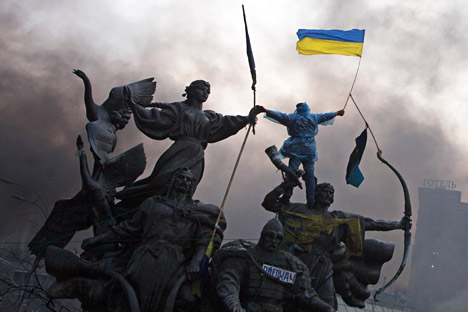The Battle of Ukraine

Fighting between radical anti-government protesters and police has claimed at least 77 lives over three days. Source: Reuters
The developments in Ukraine which have been hitting the headlines in the global media since November, acquired a dramatic turn last week with the ouster of President Viktor Yanukovich and his close allies by the Verkhovna Rada - the country's parliament.
This is the classical case of regime change in the uni-polar world and the first such case in the European democracy's ' 'twilight zone' after the decimation of Yugoslavia into smaller states loyal to the West.
The avalanche of stormy events was triggered by violence in capital Kiev's 'Euromaidan' on February 20, resulting in the regime change.
The peaceful protests began in November when Ukrainian President Viktor Yanukovich, allegedly under the Kremlin's pressure, refused to ink an act of association with the European Union and agreed to accept massive Russian bailout for this, former-Soviet Union's second most powerful republic's ailing economy.
The tug-of-war between the West and Russia for influence over Ukraine has been going on ever since the Soviet collapse in 1991. Washington probably is not satisfied with the Cold War 'booty'. Ukraine's alliance with the West would have been the creamy topping on the pie of 'vanquished' Moscow's old allies in Central and Eastern Europe.
US Assistant Secretary of State Victoria Nuland and officials from the neighbouring EU members visited Kiev to address and encourage anti-Yanukovich protesters at Euromaidan, an act unheard of, and unacceptable in the practice of democratic countries.
The cellphone conversation between Victoria Nuland and US Ambassador to Ukraine Geoffrey Pyatt in the beginning of February, allegedly leaked by the Russian security agencies, clearly indicates that the stakes were very high for the US. While discussing future dispensation in Ukraine, Ms Nuland named the concrete opposition figures acceptable to Washington and trashed the role of European Union in a political solution of the crisis by saying “F..k the EU.”
However, it was with mediation of EU, which opened the floodgates for the ouster of Yanukovich. This happened the next day after he signed the compromise deal with the opposition to seek an end to the crisis through restoration of 2004 constitution rebalancing the powers of the president and parliament and holding early presidential polls.
This is a glaring example of how the West can change its view about an accepted democracy, if its leader fails to fit into a larger game plan and cast its weight behind the violent street protesters to overthrow an unfriendly regime.
Moscow qualified the Kiev violence by the West-backed opposition as a 'coup attempt' and urged the US and EU to stop meddling into Ukraine's internal matters. Timing for the ouster of Yanukovich - 'not our son-of-a-b***h' was also perfect. With its hands tied by the Olympic oath, Russia had little options until the end of Olympic Games in Sochi.
Why is Moscow so adamant in blocking Ukraine from joining the Western camp? After all 14 former Soviet republics are now independent countries, three Baltic republics are not only in EU, but are also members of NATO military bloc, created to contain Soviet influence.
There are many reasons for Moscow's resistance to Ukraine's westward drift, they are not only geopolitical and security concerns, but also historical and emotional. Ukrainian capital Kiev was the citadel of Kievan Rus, the cradle of Russian civilisations and is considered the Mother of Russian Cities. In the heart of the Ukrainian capital in front of the History Museum on Old Kiev Hillock you can see a stone with engraving in Old Slavonic language; "Here begins the Russian Land!"
In Russian language the 'Ukraine' word means 'borderland', it had been a borderland or frontier of the Russian Empire, with its borderlines changing with ups and downs in the might of the Empire or later of the Soviet Union.
Ukraine's Black Sea territories, including the Crimea Peninsula were won by the Russian Empire in long wars with the regional rival Turkey. Before Second World War, Ukraine's western regions were Romanian and Polish territories, annexed by Stalin's Soviet Union in 1939-1940 under Molotov-Ribbentrop pact with Nazi Germany. There are forces on both sides of Ukraine's western borders, which want to review Stalin's annexation. On the other hand this country's eastern and southern territories, including Crimea Peninsula transferred to Ukraine in 1954 by the Soviet leader Nikita Khrushchev, an ethnic Ukrainian with ethnic Russian majority.
Russia's Black Sea Fleet base Sevastopol, leased from independent Ukraine after Soviet fragmentation, was a federal administered city, directly under Moscow's control and was not under Kiev's rule.
All the previous Ukrainian regimes, notorious for corruption have been cashing on the emotional and religious (Catholic - Russian Orthodox schism ) divide while flirting with the West and Russia, instead of genuine economic reforms to make this country a bridge and a hub for East-West trade for the mutual prosperity.
The current developments leave very little space of manoeuvres for Moscow, when the Russian Federation faces the real threat of NATO expansion right up to its doorstep and continued presence of its Black Sea Fleet's naval base in Sevastopol, Crimea. The best option for the new authorities in Kiev would be to strike a balance in their foreign policy and avoid steps, which could antagonise Russia.
According to a latest opinion poll 70 percent Russians are against interference in Ukrainian developments. Russian President Vladimir Putin's telephonic conversations with the US President Barack Obama, UK PM Cameron, German Chancellor Angela Merkel are also sign of efforts to seek a diplomatic end to the Ukrainian crisis.
However, further developments depend on the line of action taken by the new authorities in Kiev under the guidance of their Western mentors, who are quietly rejoicing the victory in the battle for Ukraine, which can turn out to be a pyrrhic, sparking territorial disputes in East Europe.
All rights reserved by Rossiyskaya Gazeta.
Subscribe
to our newsletter!
Get the week's best stories straight to your inbox